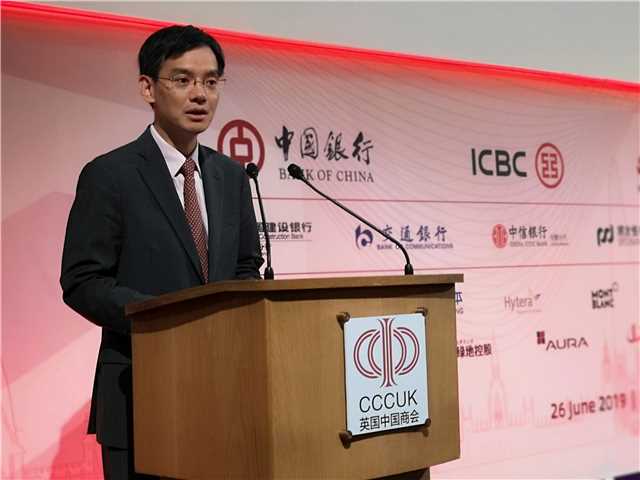UK seeking 'ambitious' post-Brexit future trade connection

Fang Wenjian, chairman of the China Chamber of Commerce in the UK and general manager of the Bank of China in London, delivers a speech at the event on Wednesday. [Angus McNeice / China Daily]
Graham Stuart, the United Kingdom's investment minister, has called for more access to China's markets and the promotion of an "ambitious future trade and investment relationship" between the nations, after Britain leaves the European Union.
He made the remarks from a China Chamber of Commerce in the UK event in London that was held to mark the second China-UK Economic and Trade Forum and the 70th anniversary of the founding of the People's Republic of China.
Stuart said Chinese investment in Britain had played a significant role in establishing the UK as a leading destination for foreign direct investment in Europe, and he made assurances that the UK's departure from the EU will not jeopardize this investment relationship.
"Our success is built on an open and dynamic economy," said Stuart. "This will not change when we leave the European Union. The UK economy remains robust."
He said that improved access to British services in China will be a "key means for facilitating China's economic transformation".
"For example, the removal of joint-venture investment requirements, and all other restrictions impacting services, would be an excellent step. The case for such liberalization is stronger than ever," he said.
Liu Xiaoming, China's ambassador to the UK, said he hopes the UK will "resist external pressure" and strive to combat rising global protectionism.
"China and the UK are both countries of global influence," Liu said from the event. "Amid rising protectionism and unilateralism, it is all the more important that China and the UK join hands to send a loud message about our opposition to protectionism and support for open cooperation. This will be our contribution to building an open world economy."
Stephen Perry, chairman of the business networking group The 48 Group Club, called China's progress during the last 70 years "one of the miracles of world history", and said British collaboration on the China-proposed Belt and Road Initiative, or BRI, marked a new chapter in the two countries' bilateral relationship.
"One of the features that makes China so attractive is the BRI — an $8 trillion project to build infrastructure from the Pacific to the Atlantic, down right through Africa, Latin America, and South America," Perry said.
He noted that Britain could provide China with crucial services for BRI projects.
"For China, our financial market is an important opportunity to grow their financing sources, because they have got a lot of investing to do and they need access to world money, especially from the bond markets that we are so capable of here," he said.
Perry added that there is a need to raise awareness of the BRI within the British business community.
"The BRI is going to be a substantial opportunity for us, we just have to learn what it is, and how to deal with it," he said. "There are very few people in the UK who understand some of the key characteristics of BRI, and one of the major tasks ahead is to understand and explain the BRI to British business and British finance."
Gao Yan, chairwoman of the China Council for the Promotion of International Trade, noted that the British government has set up a BRI expert board and appointed a BRI envoy who has been tasked with identifying potential areas of China-UK collaboration on the infrastructure and development plan, among other responsibilities.

